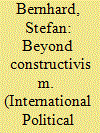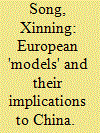|
|
|
Sort Order |
|
|
|
Items / Page
|
|
|
|
|
|
|
| Srl | Item |
| 1 |
ID:
109466


|
|
|
|
|
| Publication |
2011.
|
| Summary/Abstract |
This article applies a political sociology of knowledge to an EU social policy field. Taking the case of poverty and social inclusion policy, it shows that European social policy has found a raison d'être alongside national social policies, feeding into EU member states' national policies and producing comparative policy-relevant knowledge based on a genuine set of resources. Going beyond constructivist approaches, this article contends that the establishment of these resources can be reconstructed productively as the establishment of a transnational field in Pierre Bourdieu's sense of the term. In a process stretching over more than four decades, the EU's rudimentary policy for tackling poverty in the 1970s has evolved into a semi-autonomous field of social inclusion policy. This field encompasses monitoring capital, social capital, officializing capital, scientific capital, and informational capital, all of which EU-level actors use in different ways to position themselves against other actors in this transnational field. Thus, a complex and dynamic configuration arises that consists of actors, institutions, and ideas. The article concludes that while there are many affinities between constructivism and political sociology, the latter can go further in analyzing and theorizing phenomena such as ideas and discourses.
|
|
|
|
|
|
|
|
|
|
|
|
|
|
|
|
| 2 |
ID:
097923


|
|
|
|
|
| Publication |
2010.
|
| Summary/Abstract |
European Studies in China developed very rapidly in the last twenty years. The reasons for that are not only because of the smooth evolution of EU-China relations and wider and deeper economic interdependence between two economic giants, but also the relevance of the European models to China's domestic political and social development, as well as China's external relations. The article reviews the evolution of the European Studies in China and finds out that more and more research on European affairs relates to China's internal and external development. Two major aspects of the learning process are exploited further. Firstly, European models for China's domestic political and social development, including European party politics and Democratic Socialism, European social policy and social security systems, and European regional policies. Secondly, European models for China's foreign policy and external relations, including European neighbourhood policy, European concept of effective multilateralism, Europe as an example of peaceful rise, and functionalism as the way to East Asian regional integration. The EU or Europe has higher profile in China than any other Asia Pacific country. From the domestic political and social development and China's preference in international affairs we can see the silhouette of the European models. Chinese would like to learn more from Europe than the United States. It also shows clearly that the role of the EU as a social power.
|
|
|
|
|
|
|
|
|
|
|
|
|
|
|
|
|
|
|
|
|